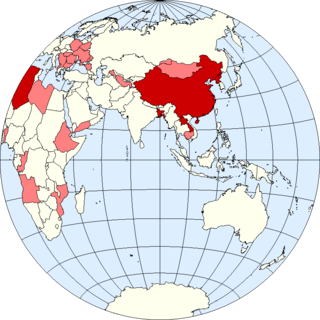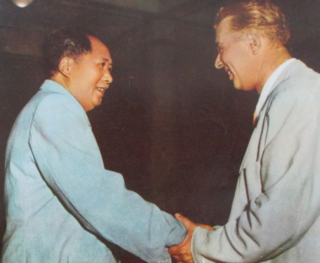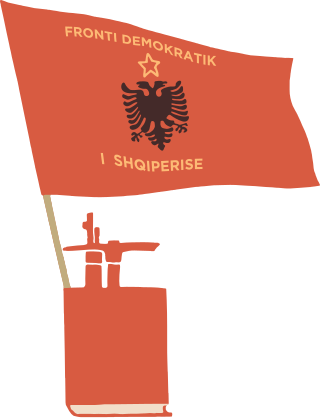The Albanian people have blazed the trail of history sword in hand. In struggle against their internal and external enemies, they have defended their existence as a people and nation, have fought for national freedom and independence, for their land and mother tongue, for their livelihood and social justice. After centuries of bondage, they achieved a major victory with the creation of the independent Albanian national state in November 28, 1912.
The national democratic and revolutionary movement was given a new impulse and content with the triumph of the great October Socialist Revolution and with the spread of communist ideas, which marked a decisive turning point for the fate of the Albanian people, too.
In the grave conditions of fascist and nazi occupation, and betrayed by the ruling classes, the Albanian people, under the leadership of the Communist Party of Albania (today, the Party of Labour) united in the National Liberation Front, rose to their feet, and arms in hand hurled themselves into the greatest war of their history for national and social liberation. In the fire of the war for freedom, on the ruins of the old state power, the new Albanian state of people's democracy emerged as a form of the dictatorship of the proletariat. On November 29, 1944, Albania won genuine independence and the Albanian people took their fate into their own hands. The people's revolution triumphed and a new epoch, the epoch of socialism, was opened.
In the conditions of the people's state power, under the leadership of the Party of the working class, great social-economic changes were carried out, which were outlined by the first Constitution of the Albanian socialist state. The domination by foreign capital and plunder of the country's riches was ended. The capitalists and big land owners were expropriated and the main means of production passed into the hands of the people. They[ sic ] way was opened for the socialist industrialization of the country. The Land Reform gave the land to those who till it, and the collectivization of agriculture set the countryside on the road of socialism.
Social ownership over the means of production and the single system of socialist economy, which prevails in town and countryside, replaced the private ownership and the multi-form economy. The exploiting classes and the exploitation of man by man were liquidated. The entire social development proceeds consciously, according to plan, and in the interest of the people.
In socialist Albania, the working class is the leading class of the state and the society. New relations of mutual assistance and cooperation have been established between the two friendly classes of our society, the working class and the cooperativist peasantry, as well as the stratum of the people's intelligentsia. The work readily contributed by free people has become the decisive factor in the flourishing of the socialist homeland, in raising the general and individual wellbeing. Albania has overcome its age-old backwardness and has been transformed into a country with advanced industry and agriculture.
The vital forces of the people were freed and their inexhaustible creative energies burst out. In the unceasing process of the revolution the Albanian woman won equality in all fields, became a great social force, and is advancing towards her complete emancipation. Education and culture have become the property of the broad masses of the people, and science and knowledge have been placed at the service of society. The foundations of religious obscurantism were smashed. The moral figure of the working man, his consciousness, and world outlook, are moulded on the basis of the proletarian ideology, which has become the dominant ideology.
Socialism has shown its absolute superiority over the old exploiting order.
Albania has entered the stage of the complete construction of socialist society. The great historic changes have created new conditions for the continuous development of the revolution and socialist construction.
The waging of the class struggle in favour of socialism, the continuous strengthening of the state of the dictatorship of the proletariat and the deepening of socialist democracy, the development of the productive forces and the perfecting of socialist relations of production, the steady raising of the wellbeing of the working masses, the gradual narrowing of distinctions between industry and agriculture, town and country, mental and physical labour, the affirmation of the personality of man within the socialist collectivity, the mastering of contemporary technology and science, the continuous revolutionization of the entire life of the country, are the main ways through which the socialist society is growing stronger and advancing.
The Albanian people are determined to defend their national independence, the people's state power and their socialist victories against any enemy. Socialist Albania is always an active factor in the struggle for national and social liberation, for peace, freedom, and the rights of all the peoples against imperialism, reaction, and revisionism. In its foreign policy it is guided by the great ideals of socialism and communism, and fights for their triumph the world over.
The Albanian people have found constant inspiration in the great doctrine of Marxism-Leninism, under the banner of which, united round the Party of Labour and under its leadership, they are carrying forward the construction of socialist society to pass over, later, gradually to communist society.







